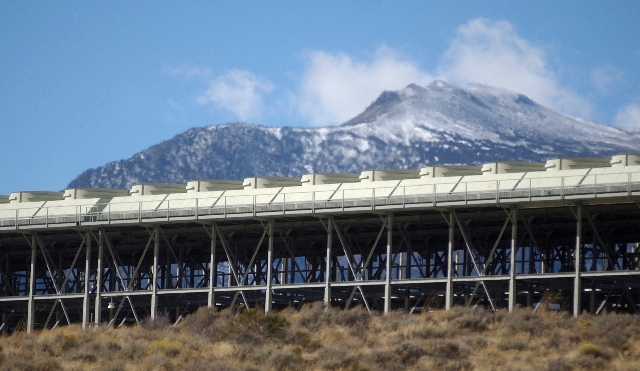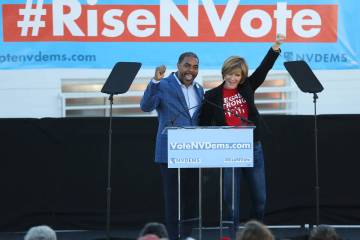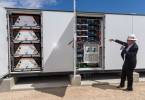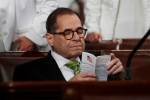Measure would cloak terms of renewable companies’ utility sales agreements
It turns out renewable-energy developers love sunlight on their solar panels, but not on their business practices.
For the second straight legislative session, lawmakers have proposed a bill that would shade the terms of renewable companies’ utility sales agreements, including price per kilowatt hour, from the scrutiny of ratepayers who cover the costs through their power bills.
Senate Bill 123, which revises regulations designed to encourage use of renewables, has a section that would prohibit the Public Utilities Commission of Nevada from disclosing “any information” concerning a contract, lease or agreement between a utility and the provider of green power. The law would make power-purchase deals “proprietary” and classify their information as “a trade secret” unless the utility and provider agree to publicize the terms.
It’s not clear who requested the rule’s inclusion in SB123, but similar language in an ill-fated 2011 bill came from solar, geothermal and wind companies in Northern Nevada, then-Sen. Mike Schneider, D-Las Vegas, said at the time.
When asked who sought the latest confidentiality clause and how it would benefit ratepayers, SB123’s sponsor, Sen. Kelvin Atkinson, D-North Las Vegas, said the rule comes from last session’s Assembly Bill 416, which Gov. Brian Sandoval vetoed. Atkinson added that the Senate will schedule working groups “pretty soon to hammer out the particulars of SB123.”
“The language that you are reading may be much different than its present form,” and is “just a starting point for discussion,” Atkinson added.
In any form, the language discomfits Eric Witkoski, the state consumer advocate who represents ratepayers in utility rate cases. Witkoski said Nevada’s energy-market structure, in which consumers pay monopoly provider NV Energy for electricity, means people should know what costs drive their power bills.
What’s more, keeping green-energy prices secret only raises added questions and encourages wild conjecture about the cost of clean power.
“When you make prices confidential, you put mystery around them,” Witkoski said. “There’s a lot of speculation. I don’t think it accomplishes transparency on what costs are. Costs have come down over the years, and I think folks should know that. The information should be available. Rumor and misinformation are not good for the industry.”
The drive for confidentiality goes back to 2010, when the Review-Journal asked to see pricing details on power buys from seven clean-energy projects, arguing that consumers had a right to know the costs before the Public Utilities Commission approved the deals.
NV Energy officials said disclosing the price per kilowatt hour could affect competition and future green-energy costs, though the company also said it saw an “important and compelling interest” in publishing the terms, which “directly and immediately” impact electric rates.
The commission ruled that contract costs became public when they were filed for the agency’s approval, and told NV Energy to release pricing details.
The contracts revealed that the seven green-power contracts cost NV Energy 8.6 cents to 13.5 cents per kilowatt hour, compared with roughly 4 cents per kilowatt hour for wholesale power from natural gas.
Less than a year later, in the next legislative session, the confidentiality clause appeared in AB416.
Witkoski discounted the idea that revealing prices would put green providers at a competitive disadvantage. When it decides whether to approve a deal, the Public Utilities Commission weighs a number of factors, including the project’s viability and the wherewithal of the developer to complete the plant. If someone has access to price points, it’s not total exposure for a project.
Commissioners seemed to agree in their Wednesday agenda meeting.
Commissioner David Noble said power prices include expenses for land, financing, labor and infrastructure, and those multiple cost layers make it difficult for any competitor to glean useful trade secrets from a general price per kilowatt hour.
Plus, asking consumers to pay for power without seeing pricing would be like making people buy gasoline without listing the cost at the pump, Noble said.
“I just have a real hard problem with keeping this type of information confidential,” Noble said. “I’d much rather have the public weigh in, or at least know what we’re doing, so at least there’s some reality check there.”
Commissioners Alaina Burtenshaw and Rebecca Wagner agreed, though Wagner also said she’s “not freaked out by this one yet,” because it’s just a starting point for talks.
Contact reporter Jennifer Robison at jrobison@reviewjournal.com or 702-380-4512. Follow @J_Robison1 on Twitter.




























